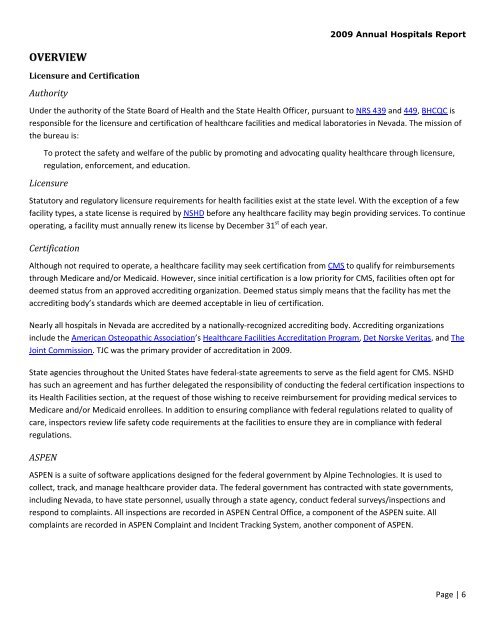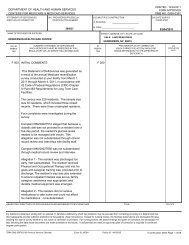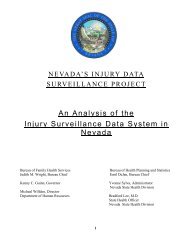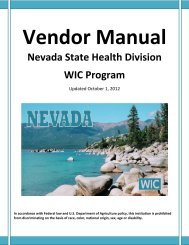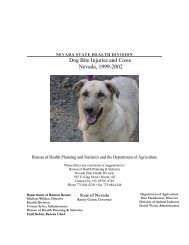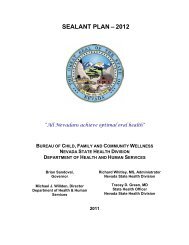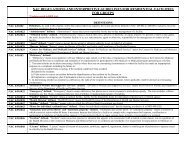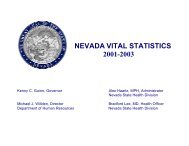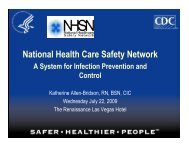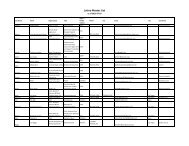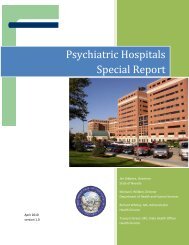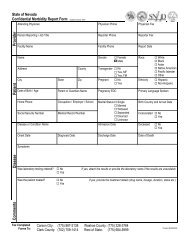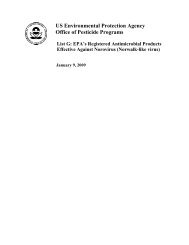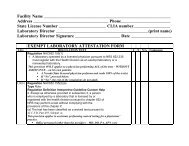- Page 1 and 2: March 2011 version 1.1 2009 Annual
- Page 3 and 4: 2009 Annual Hospitals Report Plans
- Page 5 and 6: 2009 Annual Hospitals Report APPEND
- Page 7 and 8: INTRODUCTION 2009 Annual Hospitals
- Page 9 and 10: 2009 Annual Hospitals Report preven
- Page 11: HOW TO USE THIS REPORT 2009 Annual
- Page 15 and 16: Figure 2 2009 Annual Hospitals Repo
- Page 17 and 18: 2009 Annual Hospitals Report Among
- Page 19 and 20: SCOPE OF DEFICIENCIES CITED in 2009
- Page 21 and 22: 2009 Annual Hospitals Report Figure
- Page 23 and 24: 2009 Annual Hospitals Report Figure
- Page 25 and 26: 2009 Annual Hospitals Report In 200
- Page 27 and 28: 2009 Annual Hospitals Report When a
- Page 29 and 30: 2009 Annual Hospitals Report In 200
- Page 31 and 32: Figure 17 2009 Annual Hospitals Rep
- Page 33 and 34: For all hospitals, the most common
- Page 35 and 36: Figure 20 2009 Annual Hospitals Rep
- Page 37 and 38: 2009 Annual Hospitals Report Sentin
- Page 39 and 40: 2009 Annual Hospitals Report Overal
- Page 41 and 42: 2009 Annual Hospitals Report Of the
- Page 43 and 44: 2009 Annual Hospitals Report Within
- Page 45 and 46: 2009 Annual Hospitals Report To exa
- Page 47 and 48: 2009 Annual Hospitals Report As a s
- Page 49 and 50: Findings from the Infection Risk As
- Page 51 and 52: Infection Control 2009 Annual Hospi
- Page 53 and 54: Tracking Healthcare-Associated Infe
- Page 55 and 56: 2009 Annual Hospitals Report were f
- Page 57 and 58: Hospital Inpatient Dataset Overview
- Page 59 and 60: Hospital-Acquired Conditions 2009 A
- Page 61 and 62: 2009 Annual Hospitals Report Advers
- Page 63 and 64:
2009 Annual Hospitals Report NSHD a
- Page 65 and 66:
HOSPITALS NRS 449.012 defines a hos
- Page 67 and 68:
2009 Annual Hospitals Report how to
- Page 69 and 70:
2009 Annual Hospitals Report Banner
- Page 71 and 72:
Battle Mountain General Hospital ad
- Page 73 and 74:
BHC West Hills Hospital address: 12
- Page 75 and 76:
2009 Annual Hospitals Report how to
- Page 77 and 78:
Boulder City Hospital address: 901
- Page 79 and 80:
Boulder City Hospital‘s Response
- Page 81 and 82:
Carson Tahoe Regional Medical Cente
- Page 83 and 84:
2009 Annual Hospitals Report how to
- Page 85 and 86:
2009 Annual Hospitals Report Carson
- Page 87 and 88:
3B: How will the organization measu
- Page 89 and 90:
2009 Annual Hospitals Report how to
- Page 91 and 92:
3B: How will the organization measu
- Page 93 and 94:
2009 Annual Hospitals Report how to
- Page 95 and 96:
2009 Annual Hospitals Report Centen
- Page 97 and 98:
ContinueCARE Hospital of Carson Tah
- Page 99 and 100:
2009 Annual Hospitals Report Contin
- Page 101 and 102:
2009 Annual Hospitals Report how to
- Page 103 and 104:
Desert Springs Hospital Medical Cen
- Page 105 and 106:
2009 Annual Hospitals Report how to
- Page 107 and 108:
3A: What is the long-term improveme
- Page 109 and 110:
2009 Annual Hospitals Report how to
- Page 111 and 112:
Desert Willow Treatment Center addr
- Page 113 and 114:
Dini-Townsend Hospital at Northern
- Page 115 and 116:
2009 Annual Hospitals Report Dini-T
- Page 117 and 118:
Grover C Dils Medical Center addres
- Page 119 and 120:
2009 Annual Hospitals Report how to
- Page 121 and 122:
2009 Annual Hospitals Report These
- Page 123 and 124:
2009 Annual Hospitals Report how to
- Page 125 and 126:
2009 Annual Hospitals Report Harmon
- Page 127 and 128:
HealthSouth Hospital at Tenaya addr
- Page 129 and 130:
2009 Annual Hospitals Report Health
- Page 131 and 132:
HealthSouth Rehabilitation Hospital
- Page 133 and 134:
2009 Annual Hospitals Report Health
- Page 135 and 136:
HealthSouth Rehabilitation Hospital
- Page 137 and 138:
2009 Annual Hospitals Report Health
- Page 139 and 140:
2009 Annual Hospitals Report how to
- Page 141 and 142:
2009 Annual Hospitals Report how to
- Page 143 and 144:
Incline Village Community Hospital
- Page 145 and 146:
2009 Annual Hospitals Report Inclin
- Page 147 and 148:
Kindred Hospital - Las Vegas (Flami
- Page 149 and 150:
2009 Annual Hospitals Report Kindre
- Page 151 and 152:
2009 Annual Hospitals Report how to
- Page 153 and 154:
2009 Annual Hospitals Report how to
- Page 155 and 156:
2009 Annual Hospitals Report how to
- Page 157 and 158:
GOAL 6: Reduce the risk of patient
- Page 159 and 160:
Mesa View Regional Hospital address
- Page 161 and 162:
Montevista Hospital address: 5900 W
- Page 163 and 164:
Montevista Hospital‘s Response to
- Page 165 and 166:
2009 Annual Hospitals Report how to
- Page 167 and 168:
2009 Annual Hospitals Report how to
- Page 169 and 170:
2009 Annual Hospitals Report Mounta
- Page 171 and 172:
2009 Annual Hospitals Report how to
- Page 173 and 174:
North Vista Hospital‘s Response t
- Page 175 and 176:
Northeastern Nevada Regional Hospit
- Page 177 and 178:
2009 Annual Hospitals Report how to
- Page 179 and 180:
Northern Nevada Medical Center addr
- Page 181 and 182:
2009 Annual Hospitals Report how to
- Page 183 and 184:
3B: How will the organization measu
- Page 185 and 186:
2009 Annual Hospitals Report how to
- Page 187 and 188:
Pershing General Hospital address:
- Page 189 and 190:
2009 Annual Hospitals Report Pershi
- Page 191 and 192:
2009 Annual Hospitals Report how to
- Page 193 and 194:
3A: What is the long-term improveme
- Page 195 and 196:
2009 Annual Hospitals Report how to
- Page 197 and 198:
Renown Regional Medical Center addr
- Page 199 and 200:
2009 Annual Hospitals Report how to
- Page 201 and 202:
3B: How will the organization measu
- Page 203 and 204:
2009 Annual Hospitals Report how to
- Page 205 and 206:
Renown South Meadows Medical Center
- Page 207 and 208:
2009 Annual Hospitals Report how to
- Page 209 and 210:
2009 Annual Hospitals Report Vascul
- Page 211 and 212:
2009 Annual Hospitals Report how to
- Page 213 and 214:
2009 Annual Hospitals Report Saint
- Page 215 and 216:
Seven Hills Behavioral Institute ad
- Page 217 and 218:
2009 Annual Hospitals Report how to
- Page 219 and 220:
2009 Annual Hospitals Report how to
- Page 221 and 222:
2009 Annual Hospitals Report Sierra
- Page 223 and 224:
2009 Annual Hospitals Report how to
- Page 225 and 226:
Southern Hills Hospital and Medical
- Page 227 and 228:
2009 Annual Hospitals Report how to
- Page 229 and 230:
4: Please give a statement of commi
- Page 231 and 232:
2009 Annual Hospitals Report how to
- Page 233 and 234:
2009 Annual Hospitals Report b) Imp
- Page 235 and 236:
Spring Mountain Sahara address: 546
- Page 237 and 238:
2009 Annual Hospitals Report Spring
- Page 239 and 240:
2009 Annual Hospitals Report how to
- Page 241 and 242:
Spring Valley Hospital Medical Cent
- Page 243 and 244:
2009 Annual Hospitals Report how to
- Page 245 and 246:
3A: What is the long-term improveme
- Page 247 and 248:
2009 Annual Hospitals Report how to
- Page 249 and 250:
2009 Annual Hospitals Report St. Ro
- Page 251 and 252:
St. Rose Dominican Hospitals - San
- Page 253 and 254:
2009 Annual Hospitals Report how to
- Page 255 and 256:
2009 Annual Hospitals Report standa
- Page 257 and 258:
2009 Annual Hospitals Report how to
- Page 259 and 260:
2009 Annual Hospitals Report St. Ro
- Page 261 and 262:
Summerlin Hospital Medical Center a
- Page 263 and 264:
2009 Annual Hospitals Report how to
- Page 265 and 266:
3A: What is the long-term improveme
- Page 267 and 268:
2009 Annual Hospitals Report how to
- Page 269 and 270:
2009 Annual Hospitals Report Sunris
- Page 271 and 272:
Tahoe Pacific Hospitals - Meadows a
- Page 273 and 274:
2009 Annual Hospitals Report Tahoe
- Page 275 and 276:
2009 Annual Hospitals Report how to
- Page 277 and 278:
University Medical Center of Southe
- Page 279 and 280:
2009 Annual Hospitals Report how to
- Page 281 and 282:
2009 Annual Hospitals Report Univer
- Page 283 and 284:
University Medical Center Rancho Re
- Page 285 and 286:
Valley Hospital Medical Center addr
- Page 287 and 288:
2009 Annual Hospitals Report how to
- Page 289 and 290:
3A: What is the long-term improveme
- Page 291 and 292:
2009 Annual Hospitals Report how to
- Page 293 and 294:
Willow Springs Center address: 690
- Page 295 and 296:
Willow Springs Center‘s Response
- Page 297 and 298:
APPENDICES Appendix A 2009 Annual H
- Page 299 and 300:
Level 1 Level 2 Level 3 Level 4 Lev
- Page 301 and 302:
2009 Annual Hospitals Report defici
- Page 303 and 304:
Appendix B DEFICIENCIES CITED IN 20
- Page 305 and 306:
DEFICIENCIES CITED IN 2009 deficien
- Page 307 and 308:
Appendix C URBAN HOSPITALS LICENSED
- Page 309 and 310:
Appendix D RURAL HOSPITALS LICENSED


